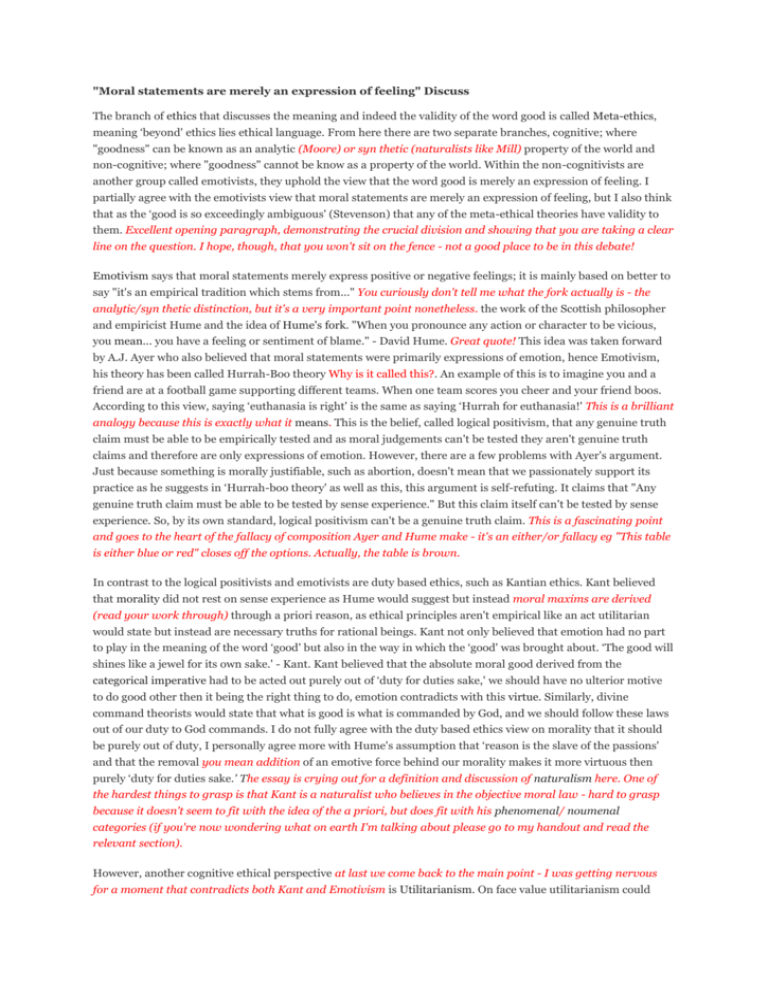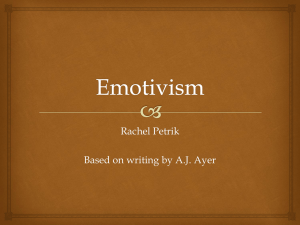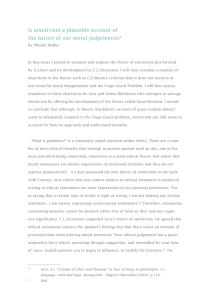File
advertisement

"Moral statements are merely an expression of feeling" Discuss The branch of ethics that discusses the meaning and indeed the validity of the word good is called Meta-ethics, meaning ‘beyond' ethics lies ethical language. From here there are two separate branches, cognitive; where "goodness" can be known as an analytic (Moore) or syn thetic (naturalists like Mill) property of the world and non-cognitive; where "goodness" cannot be know as a property of the world. Within the non-cognitivists are another group called emotivists, they uphold the view that the word good is merely an expression of feeling. I partially agree with the emotivists view that moral statements are merely an expression of feeling, but I also think that as the ‘good is so exceedingly ambiguous' (Stevenson) that any of the meta-ethical theories have validity to them. Excellent opening paragraph, demonstrating the crucial division and showing that you are taking a clear line on the question. I hope, though, that you won't sit on the fence - not a good place to be in this debate! Emotivism says that moral statements merely express positive or negative feelings; it is mainly based on better to say "it's an empirical tradition which stems from..." You curiously don't tell me what the fork actually is - the analytic/syn thetic distinction, but it's a very important point nonetheless. the work of the Scottish philosopher and empiricist Hume and the idea of Hume's fork. "When you pronounce any action or character to be vicious, you mean... you have a feeling or sentiment of blame." - David Hume. Great quote! This idea was taken forward by A.J. Ayer who also believed that moral statements were primarily expressions of emotion, hence Emotivism, his theory has been called Hurrah-Boo theory Why is it called this?. An example of this is to imagine you and a friend are at a football game supporting different teams. When one team scores you cheer and your friend boos. According to this view, saying ‘euthanasia is right' is the same as saying ‘Hurrah for euthanasia!' This is a brilliant analogy because this is exactly what it means. This is the belief, called logical positivism, that any genuine truth claim must be able to be empirically tested and as moral judgements can't be tested they aren't genuine truth claims and therefore are only expressions of emotion. However, there are a few problems with Ayer's argument. Just because something is morally justifiable, such as abortion, doesn't mean that we passionately support its practice as he suggests in ‘Hurrah-boo theory' as well as this, this argument is self-refuting. It claims that "Any genuine truth claim must be able to be tested by sense experience." But this claim itself can't be tested by sense experience. So, by its own standard, logical positivism can't be a genuine truth claim. This is a fascinating point and goes to the heart of the fallacy of composition Ayer and Hume make - it's an either/or fallacy eg "This table is either blue or red" closes off the options. Actually, the table is brown. In contrast to the logical positivists and emotivists are duty based ethics, such as Kantian ethics. Kant believed that morality did not rest on sense experience as Hume would suggest but instead moral maxims are derived (read your work through) through a priori reason, as ethical principles aren't empirical like an act utilitarian would state but instead are necessary truths for rational beings. Kant not only believed that emotion had no part to play in the meaning of the word ‘good' but also in the way in which the ‘good' was brought about. ‘The good will shines like a jewel for its own sake.' - Kant. Kant believed that the absolute moral good derived from the categorical imperative had to be acted out purely out of ‘duty for duties sake,' we should have no ulterior motive to do good other then it being the right thing to do, emotion contradicts with this virtue. Similarly, divine command theorists would state that what is good is what is commanded by God, and we should follow these laws out of our duty to God commands. I do not fully agree with the duty based ethics view on morality that it should be purely out of duty, I personally agree more with Hume's assumption that ‘reason is the slave of the passions' and that the removal you mean addition of an emotive force behind our morality makes it more virtuous then purely ‘duty for duties sake.' The essay is crying out for a definition and discussion of naturalism here. One of the hardest things to grasp is that Kant is a naturalist who believes in the objective moral law - hard to grasp because it doesn't seem to fit with the idea of the a priori, but does fit with his phenomenal/ noumenal categories (if you're now wondering what on earth I'm talking about please go to my handout and read the relevant section). However, another cognitive ethical perspective at last we come back to the main point - I was getting nervous for a moment that contradicts both Kant and Emotivism is Utilitarianism. On face value utilitarianism could seem quite similar to Emotivism or logical positivism as what is morally good is what provides the most pleasure to the greatest number, pleasure being an emotion in most peoples opinions that is good. However, whereas in Emotivism it is a matter of opinion such as ‘hoorah for genocide' - Hitler; for utilitarians the good is derived empirically as you can measure the amount of people who would gain pleasure from an act to those who receive pain. It is also for this reason that it contradicts Kantian ethics as any teleological ethical theory does, as the rightness or wrongness of an action are determined by its consequences rather then the duty behind it technically the consequences linked to the one intrinsic good of pleasure or happiness, but as well as this it's a selfish ethical theory where you act hedonistically and the rights of the minorities can be neglected. However, arguably the good is still derived from feelings, but empirically rather then through opinion. On the other hand, many would argue that there is a difference between what is pleasurable and what is good, for example going out and getting drunk may be pleasurable but is it good? There's a nice little quote from Ayer to illustrate this point see my handout on meta-ethics If you can ask this question then goodness must be independent of the feeling of pleasure, this is Hume's and indeed Ayer's attack on naturalism and in this case Bentham's utilitarianism. Another branch from meta-ethics is that of prescriptivism. Like Emotivism it is non-cognitive and it agrees that when we make a moral statement we are just expressing our own attitude, but Hare (the founder of prescriptivism) thought that we were also saying that we think other people "ought" to do a the same thing in a similar situation. ‘This action can be universalisable and so I agree with it and you ought to as well.' - Hare. Prescriptivism shows how we can be both free and rational in forming our moral beliefs. Moral beliefs can be free because they express our desires and aren't provable from facts. They can be rational because the logic of "ought" leads to a method of moral reasoning that engages our rational powers to their limits. In this sense, it is very similar to the golden rule, ‘do as you would be done by.' Yes, what your textbook calls the intrinsic sense of the word good, namely, that it is universalisable This rule is a very rational one to follow in ethical thinking as it is relativistic so can cope with special situations unlike absolutist theories such as Kant and his ‘crazy knifeman'. But it also means that good is more than just an expression of feeling but an "ought" people should obey in similar situations, in this sense I think that it is a healthy progression from the perhaps idealistic yet unrealistic Kantian ethics. In conclusion, out of the theories discussed and the ones that I have studied I find prescriptivism most appealing despite the fact that it says that ought judgments are universalisable imperatives, and not truth claims, this leads it to deny the possibility of objective moral knowledge and moral truths which seems to conflict with how we approach ethics in our daily lives. However, unlike emotivism it shows that the word good is more then just an expression of feeling but instead the basis of ethical rules, which gives it more weight as an argument. As well as this, as an ethical theory don't you mean "as a theory of ethical language that gives space for principles and rules to be rationally debated" where the rules are derived a posteriori there is a more relativistic scope then in Kantian ethics and divine command theory where their absolute rules can lead to immoral out comes. Yes. If you look at the extract written by Hare on this site you will see he was trying to counteract the conclusion that emotivism came to that we cannot have rational moral debate, and Hare is successful in establishing that moral language is language of a certain type, admittedly neither analytic nor descriptive, but meaningful nonetheless. See Louis Pojman's textbook for a brilliant couple of pages on prescriptivism and moral principles. This is an excellent A* answer because of its clarity, frequent glimpses of real insight, and its well-structured argument (plenty of technical language, names, quotes).. It doesn't quite get full marks for two reasons: 1. The paragraphs on Kant seem to deviate off the moral language point.They didn't need to. You needed a clear description and definition of naturalism. Most philosophers are naturalists (Mill, Bentham, Kant, MacIntyre) at least the ones we study, and naturalism is a very defensible view - make the defence stronger in your analysis. It is now the enmotivists who have gone into retreat. 2. The final paragraph is a little bit weak, I think, especially the last couple fo sentences don't do justice to the quality of the preceding writing - a pity, because you almost nailed this question! AO 1 19/21 AO2 13/14 Overall 32/35 Grade A*









